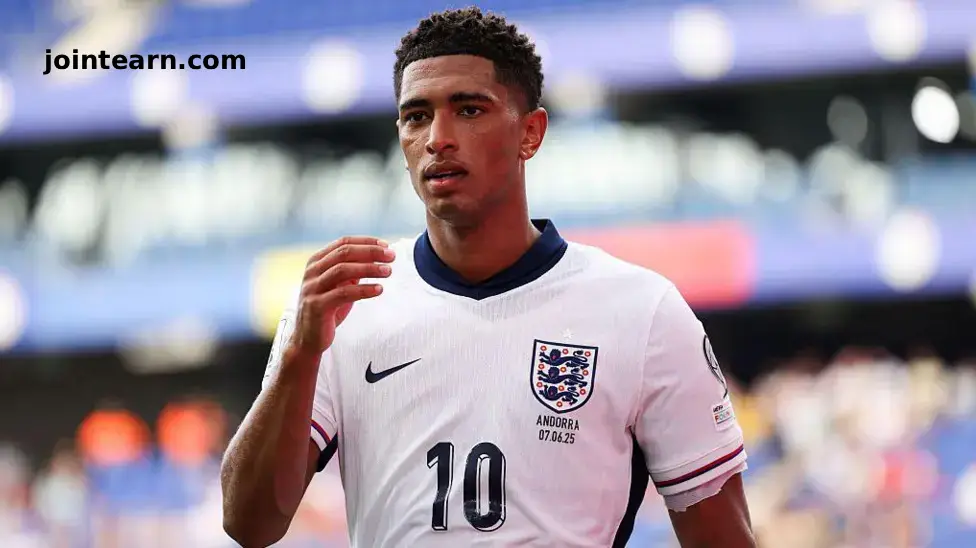
Former England striker Ian Wright has sparked major discussion after claiming that sections of the media and public are “not ready for a black superstar” in response to criticism aimed at Jude Bellingham. The 22-year-old Real Madrid midfielder has been under intense scrutiny following his visible frustration at being substituted during England’s World Cup qualifying win over Albania.
The debate has once again raised questions about racial bias in English football coverage, player image, and how high-profile black athletes are portrayed in the media.
Bellingham’s Reaction Sparks Media Debate
During England’s 2–0 win over Albania, Bellingham showed clear frustration when taken off in the 84th minute. While such reactions are common in elite sport, the midfielder’s behaviour became a focus of public commentary, prompting England manager Thomas Tuchel to say he would “review” the situation.
Tuchel, who earlier in the year apologized to Bellingham for describing parts of his on-field behaviour as “repulsive,” emphasised that substitutions must be respected but acknowledged the midfielder’s competitiveness.
Bellingham is no longer a guaranteed starter for England under Tuchel, despite shining at Euro 2024 and starring for Real Madrid. With the 2026 World Cup approaching, the midfielder’s role in the squad has become a point of debate.
Ian Wright: “Jude frightens certain people”
Speaking on The Overlap YouTube show, Wright said he believes race plays a major role in how Bellingham is treated.
“I’m worried for Jude because he’s someone they can’t control,” Wright said.
“He’s showing people: I’m here, I’m black, I’m proud. That frightens certain people.”
Wright argued that Bellingham’s confidence, visibility, and superstar status challenge the stereotypes some fans and sections of the press are comfortable with.
He added:
“Some people are not ready for a black superstar who moves like Jude. They can’t touch him — he performs, he shines, he inspires.”
Comparisons to Sterling and Pogba
Wright drew parallels with the treatment of other high-profile black players such as Raheem Sterling and Paul Pogba.
Sterling has spoken openly about being unfairly targeted by sections of the British press, particularly around Euro 2016 and the 2018 World Cup. In 2018, he publicly highlighted double standards in media portrayals of black footballers, accusing some outlets of fueling negative stereotypes.
Wright suggested the pattern has continued:
“They love a humble player like N’Golo Kanté. But when you have someone expressive like Pogba or Bellingham, it doesn’t sit well with certain people.”
Former England defender Gary Neville, appearing alongside Wright, noted that Sterling had made similar complaints to him years earlier.
Bellingham’s Rapid Rise and Global Stardom
Bellingham’s career trajectory has been extraordinary:
- Left Birmingham City in 2020 at age 17
- Became a star at Borussia Dortmund
- Joined Real Madrid for up to €133.9m (£115m)
- Won La Liga and the Champions League in his first season
- Scored 23 goals and made 13 assists in his debut campaign in Spain
- Scored one of the most iconic England goals of the decade — a 95th-minute overhead kick against Slovakia at Euro 2024
His combination of talent, maturity, charisma, and marketability has elevated him to global superstar status — making him one of the most recognisable young footballers in the world.
But Wright believes the spotlight also exposes him to racialized criticism.
Race, Visibility, and England’s Football Culture
England’s national team has long wrestled with issues of racial abuse and prejudice.
After the Euro 2021 final, Bukayo Saka, Marcus Rashford, and Jadon Sancho were all racially abused online following their missed penalties. Rashford’s mural in Manchester was vandalised before becoming a symbol of anti-racism support.
Wright argues that outspoken and highly visible black players often receive disproportionate backlash:
“If you’re black, brilliant, outspoken, and playing at an elite level, that scares people. Jude has that energy. That’s why he’s targeted.”
Tuchel: “He must accept substitutions”
Tuchel, meanwhile, insists his decisions are based purely on performance and squad standards:
“Players like Jude are so competitive they never want to come off. But he must accept it. We won’t change decisions because someone waves their arms.”
Bellingham was left out of England’s squad in October but returned for the latest qualifying fixtures.
What’s Next for Bellingham and England?
Despite recent debate, Bellingham remains one of the most talented players of his generation. His place in England’s World Cup squad is still expected, though Tuchel has made clear that consistency and discipline matter.
Off the pitch, however, Wright’s comments have reignited a broader national conversation about race, representation, and how the media treats superstar black athletes.


Leave a Reply